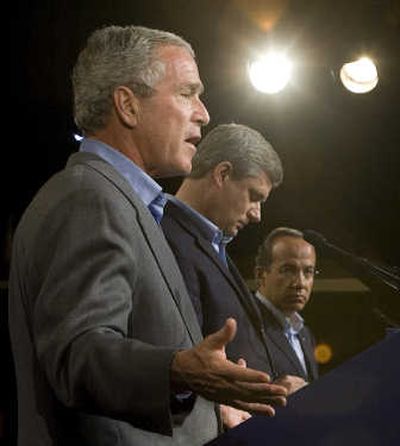Bush speech to link Vietnam, Iraq

KANSAS CITY, Mo. – Critics of the war in Iraq who compare the conflict to Vietnam have the analogy backward, President Bush plans to tell veterans in a speech today.
In what the White House is billing as a major foreign policy address, the president will say that the lessons of Vietnam teach that the United States should stay in Iraq and not withdraw. He will note that terrorists cite Vietnam to predict the United States will run from the Iraq war.
“Here at home, some can argue our withdrawal from Vietnam carried no price to American credibility – but the terrorists see things differently,” Bush plans to tell a Veterans of Foreign Wars convention, according to speech excerpts released late Tuesday by the White House.
Bush will argue that the U.S. withdrawal from Vietnam had dire consequences for the people in its region and so would a withdrawal from Iraq.
“Three decades later, there is a legitimate debate about how we got into the Vietnam War and how we left,” Bush will say. “Whatever your position in that debate, one unmistakable legacy of Vietnam is that the price of America’s withdrawal was paid by millions of innocent citizens whose agonies would add to our vocabulary new terms like ‘boat people,’ ‘re-education camps’ and ‘killing fields.’ “
The release of the lengthy excerpts was an unusual move by the White House, which rarely provides advance text of presidential addresses. It was also unusual in that Bush has tended to steer clear of analogies with Vietnam, which critics increasingly have compared with the Iraq war.
White House counselor Ed Gillespie said the speech would be the first of two designed to lay the rhetorical groundwork for a progress report Congress has sought in mid-September as part of the debate over whether and how to continue funding military operations in Iraq.
“As we face challenges in Iraq today, we do so knowing we have done this kind of transformative work before and the benefits to America made the sacrifices worthwhile,” Gillespie said in a statement explaining the early release of the speech excerpts.
Today’s speech will stress how the U.S. “perseverance in Asia led to a freer, more stable and more prosperous continent,” Gillespie said. Next Tuesday, in a speech to the American Legion, the president will address the importance of Iraq to the future of the Middle East.
“Prevailing in this struggle is essential to our future as a nation,” the president will argue Wednesday, according to the excerpts. “The question now before us comes down to this: Will today’s generation of Americans resist the deceptive allure of retreat – and do in the Middle East what veterans in this room did in Asia?”
Senate Majority Leader Harry Reid, D-Nev., criticized Bush’s speech as trying to evade responsibility for his decision to lead the nation into the war.
“President Bush’s attempt to compare the war in Iraq to past military conflicts in East Asia ignores the fundamental difference between the two,” Reid said in a statement. “Our nation was misled by the Bush administration in an effort to gain support for the invasion of Iraq under false pretenses, leading to one of the worst foreign policy blunders in our history.”
Historian Robert Dallek, who has written about the comparisons of Iraq to Vietnam, accused Bush of twisting history.
“We were in Vietnam for 10 years. … What is Bush suggesting? That we didn’t fight hard enough, stay long enough? That’s nonsense, it’s a distortion,” he said in a telephone interview. “We’ve been in Iraq longer than we fought in World War II. It’s a disaster, and this is a political attempt to lay the blame the for the disaster on his opponents.”
Bush has long compared the Iraq war to World War II. For instance, in a 2004 speech at the Air Force Academy, the president said that “like other totalitarian movements, the terrorists seek to impose a grim vision in which dissent is crushed, and every man and woman must think and live in colorless conformity.”
But in previous appearances, Bush usually has sidestepped comparisons between Iraq and Vietnam. When he has mentioned Vietnam, it usually has been to emphasize that the two conflicts are dissimilar.
“Many critics compare the battle in Iraq to the situation we faced in Vietnam,” Bush told graduates of the Coast Guard Academy in May. “There are many differences between those two conflicts, but one stands out above all: The enemy in Vietnam had neither the intent nor the capability to strike our homeland. The enemy in Iraq does.”